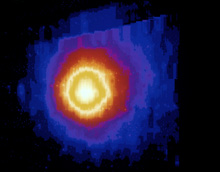http://www.cnn.com/2009/US/01/15/new.york.plane.crash/
For a rocket launching a satellite to space, things in your flight path can make for a bad day as well.
We think about going to the Moon with astronauts again and setting up shop on the Moon.
When that happens the number of launches to space will increase and the concern for where the latest space debris is will be on their minds.
Gunjan reports that India is still on track to put humans in orbit with their first manned spaceship around 2015.
http://www.space.com/businesstechnology/090211-india-manned-spaceship.html
China has orbited their astronauts with their third space mission in September 2008.
http://news.bbc.co.uk/1/hi/world/asia-pacific/4333158.stm
http://www.reuters.com/article/scienceNews/idUSTRE48O9VL20080926
Pings on a satellite can be expensive and be a cause for more space debris.
Pings on a spaceship with humans aboard is even more concern.
We have had a few satellites break up and just recently two satellites collided.
This is not good and will add to the risk of launching to space.
Who keeps track of where our man made junk orbits?
http://www.orlandosentinel.com/news/local/state/orl-spacejunk0809feb08,0,7720847.story
http://www.newscientist.com/article/dn16584-satellite-collision-creates-copious-space-junk.html
Satellite collision creates copious space junk
http://online.wsj.com/article/SB123438921888374497.html
FEBRUARY 12, 2009
Andy Pasztor in the WSJ online says:
"The accident could have implications for U.S. space budgets and policy, partly because it comes amid a Pentagon campaign to increase spending on systems to protect U.S. high-tech space hardware by keeping better track of the thousands of pieces of debris and other satellites circling the Earth."
Thanks for looking up with me.
Larry Kellogg
Web Site: http://lkellogg.vttoth.com/LarryRussellKellogg/
BlogSpot: http://kelloggserialreports.blogspot.com/
RSS link: http://kelloggserialreports.blogspot.com/atom.xml
Newsletter: https://news.altair.com/mailman/listinfo/lunar-update
==============================================================
http://www.newscientist.com/article/dn16584-satellite-collision-creates-copious-space-junk.html
Satellite collision creates copious space junk
Two space satellites smashed into each other on Tuesday in an unprecedented orbital accident. Government agencies are still assessing the aftermath, but early radar measurements have detected hundreds of pieces of debris that could pose a risk to other spacecraft.
As first reported by CBS News, a defunct Russian Cosmos satellite and a communication satellite owned by the US firm Iridium collided some 790 kilometres above northern Siberia on Tuesday.
"This is the first time that two intact spacecraft have accidentally run into each other," says Nicholas Johnson, chief scientist of NASA's Orbital Debris Program Office in Houston, Texas.
snip
==============================================================
http://www.orlandosentinel.com/services/newspaper/printedition/thursday/orl-boom1209feb12,0,5890449.story
Satellites collide for first time ever in orbit
The Associated Press
February 12, 2009
CAPE CANAVERAL - Two communications satellites have collided in the first-known crash of two intact spacecraft in orbit, NASA said Wednesday.
The collision occurred Tuesday nearly 500 miles over Siberia. The crash produced a pair of massive debris clouds, and the situation's magnitude won't be known for weeks at least, NASA spokesman Kelly Humphries said.
But any risk to the international space station, which orbits below the collision course, is thought to be low. There also should be no danger to the upcoming shuttle flight, targeted for liftoff no earlier than Feb. 22, "but they're continuing to analyze any possible risk," Humphries said.
The collision involved an Iridium commercial satellite, which was launched in 1997, and a Russian satellite launched in 1993 and thought to be nonfunctioning.
snip
==============================================================
==============================================================





No comments:
Post a Comment
Note: Only a member of this blog may post a comment.